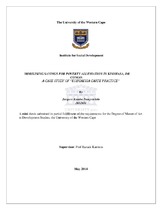Mobilising savings for poverty alleviation in Kinshasa, Dr Congo: a case study of “Kobuakisa Karte practice’’
Abstract
This study explores the informal saving institutions, with a particular focus on the Kobuakisa Carte practice, which is an informal financial institution that mobilizes savings for poverty reduction among low-income people in Kinshasa, Democratic Republic of Congo. The research investigates the extent to which the Kobuakisa Carte serves the purpose of mobilizing savings for poverty alleviation. It is hypothesized that Kobuakisa Carte influences informal savings, enables the poor to satisfy their basic material needs, reduces poverty and consequently leads to individual empowerment and development. This study integrated the case study methodology in its research design. It applied both qualitative and quantitative methods. The qualitative research data comprised document analysis, interviews with Kobuakisa Carte’s clients and officers. In addition, a questionnaire was utilized to gather quantitative research information from 50 informal traders. The findings of the study reveals that Kobuakisa Carte has not have a positive impact towards poverty reduction. Informal savings were incapable of helping the poor to increase their income because they were small in amount and were mainly used for fulfilling basic needs rather than financing income-generating activities. Savings from Kobuakisa Carte were used for survival rather than for poverty reduction. The majority of the poor favor Kobuakisa Carte due to its flexibility and adaptation to local culture and values. The study finds that the most positive impact of the scheme on the welfare of the poor was in the areas of education, health, food and housing. The scheme has the potential to empower the poor and to develop local finance system in following bottom up approach. This study recommends the partial integration of Kobuakisa Carte into formal financing channels and should be given proper recognition and adequate consideration in the nation’s financial system. The study concludes that Kobuakisa Carte is an active and dynamic saving scheme. It has demonstrated the potential to alleviate poverty. It needs to be studied and requires support in order to make it more effective.

